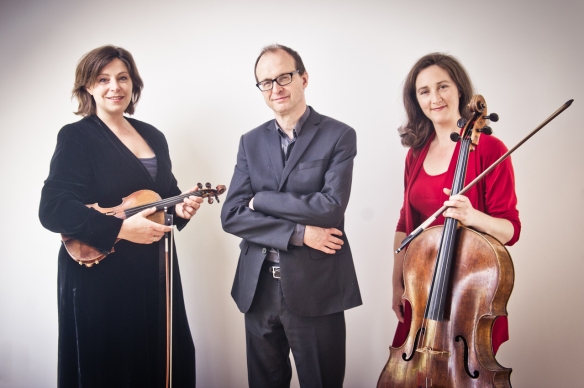
Gould Piano Trio [Lucy Gould (violin), Richard Lester (cello), Benjamin Frith (piano)]
Mozart Piano Trio in G major K564 (1788)
Clarke Piano Trio in E flat minor (1921)
Ravel Piano Trio in A minor (1914)
Wigmore Hall, London, 29 October 2020
Reviewed by Richard Whitehouse
This latest event in the Wigmore Hall season saw a welcome recital by the Gould Trio, now well into its third decade and whose frequent appearances at this venue have always featured music from right across the medium of the piano trio; with tonight’s programme no exception.
A medium to which Mozart came relatively late in his career, producing five such works in little more than two years. Last in this sequence, K564 has rather remained in the shadow of its predecessors; unfairly so, as motivic interplay across and between its three movements is comparable to any of his more imposing pieces of this time. Such was affirmed in a reading which brought out the muscular interplay of its Allegro, the wistful elegance of its Andante then the relaxed nonchalance of a final Allegretto as ranks among Mozart’s most endearing.
Would that Rebecca Clarke had followed up her solitary contribution; the Piano Trio belonging to a clutch of pieces that should have laid the basis for a composing career but were destined to remain the peak of her achievement. The influence of Debussy and Ravel is often cited, but the vehemence of Bartók’s music from this period is equally evident – witness the emotional volatility of the first movement (which predates the similarly conceived opening movement of the Hungarian composer’s First Violin Sonata), fraught eloquence of the central Andante then driving impetus of the final Allegro; its powerful culmination subsiding into a resigned coda whose defiant ending feels almost in spite of itself. A fine performance by an ensemble which was championing this piece well before it attained the recognition it now justly enjoys.
If Ravel’s Piano Trio has never lacked for advocacy over the century and more since it was first performed, it remains a tough challenge both technically and interpretively. The present account was perhaps a shade under-characterized in the simmering dance rhythms of the first movement, with the Scherzo’s deft syncopations similarly downplayed at least until the sheer effervescence of its closing bars. No doubts, though, as to the ensuing Passacaglia – building methodically yet irresistibly to its baleful climax before winding down into the depths of the piano, from whence the finale steals in. The latter movement has been criticized for exuding near-orchestral sonorities, but Ravel’s handling of this is astutely judged – not least in a coda whose hard-won triumph in the face of encroaching adversity was powerfully conveyed here.
It certainly made for an impressive conclusion to this recital, just the sort of programme that feels necessary at such a time as this. Hopefully, these next few weeks will bring no cessation on the part of Wigmore Hall or the Gould Trio – their activities necessary now more than ever.
This concert can be streamed again until 29 November via the YouTube link above, or through the Wigmore Hall website here
These Wigmore Hall concerts are free to view but the venue is relying on the generosity of its audience to make them possible. If you do watch the concert, please consider making a donation, either at the Wigmore Hall website or via PayPal
